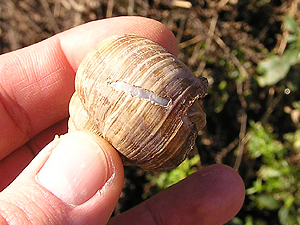
The remains of snails killed by carabids on a snail farm.
Picture: [RN].
 The remains of snails killed by carabids on a snail farm. Picture: [RN]. |
Carabids or ground beetles are a beetle family rich in species, which are usually nocturnal and mainly carnivorous. They generally hunt other invertebrates crawling on the ground, such as insects, and also snails and slugs. So generally the 85 species of carabids known to occur in Central European are valued by gardeners as beneficial animals.
 A Roman snail (Helix pomatia) with the traces of a carabid attack already in repair. Picture: [RN]. |
Where carabids hunt for snails, afterwards many damaged and emptied shells can be found. The beetles attack the snail by paralysing it with a bite and then cutting up the shell whorls along the spire using their mandibles.
In snail farms often many snail shells can be found in one place together, where ground beetles had their hunting ground.
On the other hand shells with freshly repaired traces of carabid attacks also show that snails are very well able to withstand such an attack.
At least they survived long enough to begin repairing the damage.
Not few of them die later, though, as ground beetles paralyse their prey by injecting a poison its organism, which proves to be lethal later. The aggressive beetles attack mainly smaller snail species, but also the larger Roman snails are not immune against an attack, even if they may be better protected by their thicker shell.
In snail farms many snail live in pens surrounded by fences. So here carabids and other carnivorous beetles can wreak great damage.